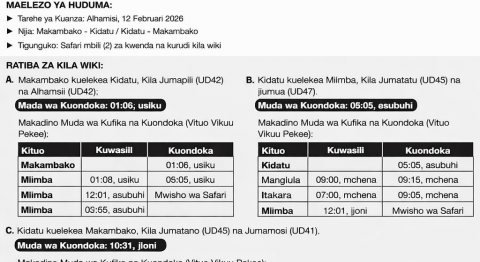The Managing Director of the Tanzania-Zambia Railway Authority (TAZARA), Eng. Bruno Ching’andu has laid out his vision to the employees, calling on every worker to be customer-centric in order to turn the Authority into the best transport organization in the region.
Speaking when he addressed over 500 Dar es Salaam based employees on Thursday 16 June 2016, in Dar es Salaam, Eng. Ching’andu said he wants to preside over a workforce that is proud to work for TAZARA, paid handsomely and competitively and operating in a safe environment, with plenty of opportunities to learn and grow.
“I dream of a TAZARA whose workers are proud and happy to be working for this company.
I want us to be customer-centric, giving maximum respect to our clients and contributing to the growth of the economies of Tanzania and Zambia by paying taxes and dividends to the shareholders,” he said.
The Managing Director challenged the workers to show commitment by giving him maximum support, working as a unified team with one common goal in order to eliminate the divisive tendencies that pulled the Authority backwards.
At the different forums he addressed the workers, the Managing Director made the employees shout in unison after him “One TAZARA, One TAZARA, One TAZARA”, a thematic orientation he has demanded every employee to adopt in order to foster unity in the organization.
Eng. Bruno Ching’andu has further urged employees to discard the begging mentality and begin to perform because the Authority has everything it requires to raise output and revenue generation.
He said he left a well-paying job in South Africa to join TAZARA because he knew it was possible to turn-around the Authority and begin to earn sustainable revenue, enough to pay employees’ salaries, taxes and dividends to the shareholders.
“This company has everything it needs to make money. The Chinese came, built the infrastructure and handed it to us to manage, some of them losing their lives in the process.
They gave us fishing rods and taught us how to fish, but immediately they left we also went back to sleep, threw away the fishing rods and started to beg for fish,” the Managing Director lamented with disgust.
He said he would not be part of the begging culture and neither would he want to manage beggars, urging every employee to stop asking for handouts and instead focus on being productive in order to earn their salaries.
The Managing Director said that as a step towards revitalisation, it was important to acknowledge that the current performance of TAZARA was a huge disappointment to the founders of TAZARA, who worked tirelessly to ensure the realization of a railway that connected Zambia to the Eastern Coast of Africa.
“You may argue about the timing of the funding and the quantities in which it was granted, but it is undisputable that a lot of money has been poured into TAZARA over the years by the governments of China, Tanzania and Zambia and everyone expects us to show appreciation by performing,” he said.
In response, the workers thanked the Managing Director for sharing his vision and promised to rally behind him, but requested that he decisively deals with incompetent and errant managers.
The workers also called for improved communication at all levels.
Eng. Ching’andu is in his second month at the helm of TAZARA, having taken up the position as the Authority’s Chief Executive Officer in April 2016.
He has since embarked on a tour of the infrastructure from Dar es Salaam to New Kapiri-Mposhi, meeting and addressing all employees to sell his vision and demand that the rededicate themselves to the turnaround of the firm, whose annual freight haulage has dropped from a high of 1.2 million tones in 1976 to less than 90,000 tones in the 2014/2015 Financial Year.
The Authority is expected to post improved haulage in the 2015/2016 Financial Year ending 30th June 2016.
Since joining, Eng. Ching’andu has instilled discipline in the railway operations, with the firm now registering consistent and shorter transit times in freight trains as well as passenger trains, an impediment that tended to drive clients away in the past.
ENDS.




